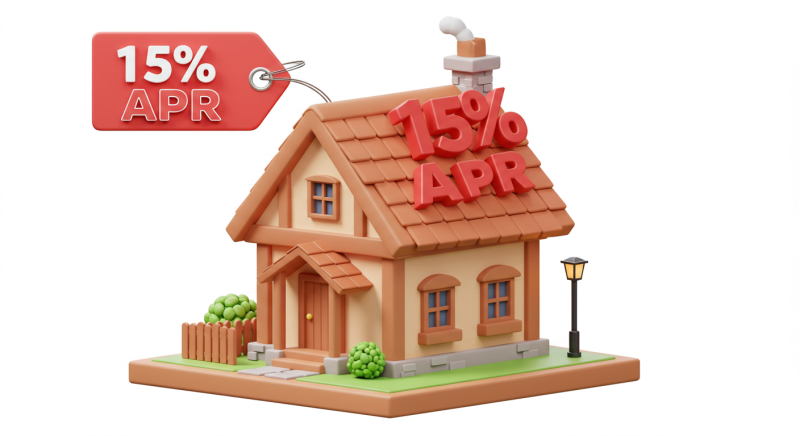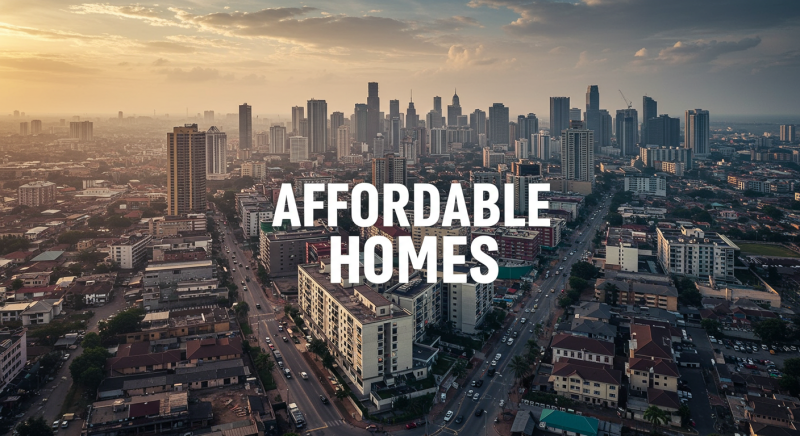For years, Adaora, a 32-year-old teacher in Lagos, dreamed of owning a home. Despite saving diligently, traditional banks’ steep mortgage interest rates—often exceeding 25%—kept her dream out of reach. Then, she discovered a Nigerian startup offering flexible rates at 18%. Her story mirrors a quiet revolution: mortgage interest rates in Nigeria are reshaping the path to homeownership for thousands.
Key Takeaways
Nigeria’s startup ecosystem is challenging traditional mortgage frameworks by introducing competitive interest rates, innovative loan structures, and tech-driven accessibility. Startups like Estate Intel and RentSmallSmall now offer rates between 15%–25%, significantly lower than conventional banks. Factors like credit flexibility, digital affordability tools, and partnerships with real estate developers further enhance their appeal.

The Current Landscape of Mortgage Interest Rates in Nigeria: A Transformative Shift in Homeownership
Nigeria’s mortgage sector, long dominated by traditional banks with prohibitive interest rates and rigid eligibility criteria, is undergoing a dramatic transformation. Enterprising startups are rewriting the rules, leveraging cutting-edge technology and innovative models to slash mortgage interest rates in Nigeria and make homeownership accessible to a broader audience. For millions like Adaora, these startups aren’t just financial platforms—they’re lifelines turning distant dreams into tangible reality.
Startups vs. Traditional Banks: A Rate Revolution
While conventional banks still impose mortgage interest rates as high as 30%, startups are disrupting the status quo with rates ranging from 15% to 22%. For instance, Estate Intel, a Lagos-based proptech pioneer, offers first-time buyers rates as low as 17.5%, coupled with flexible tenures of up to 25 years. Similarly, RentSmallSmall has gained traction with its hybrid “rent-to-own” model, allowing tenants to allocate a portion of their monthly rent toward eventual homeownership at fixed rates. These startups are not merely competing on price—they’re redefining affordability through inclusivity.
Tech-Driven Solutions Fueling Accessibility
The secret sauce behind lower mortgage interest rates in Nigeria startups lies in their tech-first approach. By harnessing alternative credit scoring systems, platforms like HouseMe evaluate applicants using nontraditional data—think utility payments, rent history, and even social media transactions—to serve underserved groups like freelancers and informal workers. Digital tools streamline loan processing, reducing overhead costs and enabling startups to pass savings to customers. For example, CribMD integrates automated risk assessments to approve mortgages in 72 hours, a stark contrast to the weeks-long waits at traditional institutions.
Impact on Homeownership: Numbers Tell the Story
The ripple effect of these innovations is undeniable. A recent Central Bank of Nigeria report revealed that startup-driven mortgage solutions contributed to a 12% spike in urban homeownership among millennials since 2022. Startups are also bridging gender gaps: HerRoo, a female-focused proptech, reports that 60% of its beneficiaries are single women, many of whom were previously deemed “high-risk” by mainstream lenders. Furthermore, partnerships with developers, such as Co-built’s collaboration with Lagos State, have delivered over 2,000 affordable units in the past year, priced 30% below market rates.
Navigating Challenges: Inflation, Regulation, and Trust
Despite progress, Nigeria’s volatile economy poses hurdles. Soaring inflation (28.9% in 2024) and naira fluctuations compel startups to adopt hybrid rate models—part-fixed, part-floating—to hedge risks. Land title fraud remains a thorny issue, though startups like HouseAfrica are tackling this via blockchain-powered verification systems. Regulatory collaboration is also critical; the Federal Mortgage Bank of Nigeria’s (FMBN) recent partnership with Spleet to subsidize rates for civil servants exemplifies how public-private synergy can amplify impact.
The Road Ahead: Scaling Solutions Nationwide
The future looks promising. With venture capital flooding Nigeria’s proptech space—evidenced by PropertyPro.ng’s $5.2M funding round—startups are scaling rapidly. Emerging trends include green mortgages for eco-friendly homes and AI-driven chatbots (like Kuda’s “Kudi”) that guide users through rate comparisons in real time. As smartphone penetration deepens, expect rural areas to join the fray, further democratizing access to fair mortgage interest rates in Nigeria.
In essence, mortgage interest rates in Nigeria startups are more than numbers—they’re catalysts for social change. By blending innovation with empathy, these platforms are dismantling barriers and ensuring that, for millions, the keys to a home are no longer a mirage but a milestone within reach.
4 Factors Influencing Mortgage Rates in Nigeria’s Sector
Nigeria’s mortgage ecosystem is redefining affordability through innovation, but several interconnected factors shape how these platforms structure their mortgage interest rates in Nigeria startups. Below, we delve into the forces driving rate competitiveness and accessibility in this dynamic sector.
Regulatory Partnerships and Policy Synergy
Collaborations with government-backed institutions like the Federal Mortgage Bank of Nigeria (FMBN) enable startups to access subsidized funds, reducing borrowing costs for end users. For instance, the FMBN’s National Housing Fund (NHF) allows startups like Co-built to offer mortgages as low as 6% to eligible civil servants and low-income earners. These partnerships also streamline compliance with housing policies, fostering trust and scalability. However, startups must navigate evolving regulations, such as land title reforms and blockchain-powered verification systems pioneered by firms like HouseAfrica, to mitigate risks like fraud and delays.
Tech-Driven Efficiency and Risk Mitigation
Startups are slashing operational costs—and passing savings to borrowers—through AI-powered tools. Platforms like HouseMe use alternative credit scoring models, analyzing rent payments, utility bills, and even social media activity to assess borrower reliability. This inclusivity expands eligibility for freelancers and informal workers, who are often excluded by traditional banks. Automated underwriting systems, such as CribMD’s 72-hour approval process, further reduce overheads, enabling startups to offer rates 5–8% lower than conventional lenders.
Investor Confidence and Venture Capital Inflows
A surge in proptech funding is fueling rate competitiveness. In 2024, Nigerian mortgage startups secured over 50 million in venture capital, with firms like Spleet raising 10 million to scale hybrid rent-to-own models. This influx allows startups to experiment with flexible products, such as Rent Small Small’s equity-building rentals, which lock in fixed rates for tenants transitioning to ownership. Investor appetite is also driving partnerships with global fintechs, enabling startups to hedge against currency volatility and offer dollar-denominated loans.
Economic Trends and Adaptive Financial Models
Nigeria’s macroeconomic volatility—28.9% inflation in 2024 and naira instability—compels startups to adopt hybrid rate structures. For example, Kuda’s “HomeNow” product combines fixed rates for the first three years with floating rates thereafter, shielding borrowers from sudden spikes. Additionally, rising construction costs (cement prices doubled in 2023–2024) push startups to focus on suburban affordable housing projects, where land and material expenses are lower.
The Road Ahead: Balancing Innovation and Stability
While startups are democratizing access to mortgage interest rates in Nigeria startups, challenges like inflation and regulatory bottlenecks persist. However, trends like blockchain-based title verification and AI-driven affordability tools signal a future where rates could dip further. As venture capital continues to flow and partnerships with institutions like the FMBN deepen, Nigeria’s mortgage startups are poised to turn homeownership from a privilege into a widespread reality.

How to Secure Lower Mortgage Interest Rates in Nigeria: A Step-by-Step Guide
Navigating Nigeria’s mortgage landscape can feel overwhelming, but startups are pioneering accessible pathways to affordable homeownership. If you’re wondering how to secure lower mortgage interest rates in Nigeria startups, this guide unpacks actionable strategies to help you save costs, negotiate smarter, and unlock opportunities that align with your financial goals.
Build a Strong Credit Profile with Alternative Data
Traditional banks often overlook non-salaried workers, but startups like Bumpa and HouseMe prioritize alternative credit scoring. By consistently paying rent, utilities, or even subscriptions through digital platforms, you can build a financial footprint that demonstrates reliability. For example, RentSmallSmall partners with credit bureaus to convert rental payments into credit scores, directly influencing the mortgage interest rates in Nigeria startups offer. Freelancers and gig workers can leverage apps like FairMoney to track and showcase income streams, increasing eligibility for competitive rates.
Leverage Government-Backed Housing Schemes
Government initiatives remain a goldmine for affordable financing. The Federal Mortgage Bank of Nigeria (FMBN) collaborates with startups like Co-built to offer loans as low as 6% under the National Housing Fund (NHF). Civil servants, entrepreneurs, and low-income earners can apply through partner platforms, often with reduced documentation. For instance, HerRoo tailors NHF-linked products for single women, slashing rates by 3–5% compared to standalone offers.
Negotiate Flexible Terms and Hybrid Models
Startups thrive on flexibility. Don’t hesitate to negotiate longer tenures (e.g., 25–30 years) to lower monthly payments. Platforms like CribMD allow borrowers to refinance after 5 years, adjusting rates based on improved creditworthiness. Additionally, explore hybrid models: Kuda’s “HomeNow” mortgage combines fixed rates for the first 3 years with floating rates thereafter, cushioning borrowers against inflation spikes.
Compare Rates Digitally and Tap Real-Time Tools
Gone are the days of visiting multiple banks. Aggregators like PropertyPro.ng and Estate Intel let you compare mortgage interest rates in Nigeria in real time, filtering by location, income bracket, and property type. AI chatbots, such as Spleet’s virtual advisor, analyze your financial data to recommend the most cost-effective options. For tech-savvy buyers, HouseAfrica’s blockchain-powered platform even predicts future rate trends, helping you lock in deals before market shifts.
Partner with Proptechs for Pre-Approval Advantages
Startups like LegitCar and RentSmallSmall offer pre-approval programs that reserve lower rates for qualified buyers. By submitting basic financial details upfront, you can “freeze” a rate for 60–90 days while house hunting. This tactic is especially useful in volatile markets, where a sudden rate hike could derail your budget.
Stay Informed on Market Trends and Incentives
Nigeria’s mortgage startups frequently roll out seasonal promotions. Follow platforms like Estate Intel on social media for flash sales, where rates drop by 2–3% for limited periods. Additionally, green mortgages are gaining traction: Ecobank’s partnership with HouseMe offers a 1.5% discount for eco-friendly home upgrades like solar panels.
Final Tip: Build Relationships with Startup Advisors
Many startups assign dedicated agents to guide first-time buyers. For example, Co-built’s “Home Champions” help clients navigate paperwork, negotiate rates, and identify hidden fees. A proactive approach can shave 0.5–2% off your final rate.
The Road Ahead: Sustainability and Challenges
While startups democratize access, challenges persist. High construction costs and land title fraud inflate property prices, offsetting rate benefits. However, partnerships with blockchain firms like HouseAfrica for title verification signal progress. The Central Bank’s push for a unified mortgage database could further stabilize rates.

FAQs on Mortgage Interest Rates in Nigeria: Your Top Questions Answered
Q: Who qualifies for mortgage loans from Nigerian?
A: Unlike traditional banks, startups prioritize inclusivity. Salaried workers, freelancers, entrepreneurs, and even informal traders can qualify. Platforms like LegitCar and HouseMe evaluate alternative data—such as consistent rent payments, business revenue tracked via apps like Bumpa, or mobile money transactions—to assess eligibility. Some startups, like HerRoo, even cater to niche groups like single women or young professionals.
Q: Can I get a mortgage if I don’t have a down payment?
A: Yes! Startups like RentSmallSmall and Spleet offer “rent-to-own” models where a percentage of your monthly rent contributes to the down payment. Others, such as Co-built, partner with the Federal Mortgage Bank of Nigeria (FMBN) to provide NHF-backed loans requiring as little as 10% upfront.
Q: How do economic factors like inflation affect startup mortgage rates?
A: Nigeria’s inflation (28.9% in 2024) and currency volatility push startups to adopt hybrid rate structures. For example, Kuda’s “HomeNow” mortgage locks rates for the first 3 years, then adjusts them based on market conditions. Startups like HouseAfrica also use blockchain to hedge against risks, stabilizing long-term rates.
Q: Are startup mortgages safer than bank loans?
A: Startups prioritize transparency and tech-driven safeguards. Platforms like Estate Intel provide real-time loan tracking, while HouseAfrica uses blockchain to secure land titles and prevent fraud. However, always verify a startup’s licensing with the Central Bank of Nigeria (CBN) or FMBN before committing.
Q: What documents do I need to apply?
A: Requirements vary, but most startups simplify the process. For example, RentSmallSmall only needs a valid ID, proof of income (e.g., bank statements or business invoices), and a tenancy history. Tech-focused platforms like CribMD allow digital uploads via their apps.
Q: Can I refinance an existing mortgage with a startup for a lower rate?
A: Absolutely. Startups like PropertyPro.ng and Estate Intel offer refinancing options if your credit score improves or market rates drop. CribMD even allows rate renegotiation after 5 years, potentially saving you millions over the loan’s lifespan.
Q: Do startups offer mortgages for rural properties?
A: While most focus on urban centers, startups like Co-built and FMBN partners are expanding to rural areas. HouseMe recently launched a pilot program in Ogun State, offering rates 2% lower than urban averages to incentivize rural development.
Q: How long does approval take with a startup vs. a bank?
A: Startups are lightning-fast. CribMD approves loans in 72 hours using AI, while traditional banks take weeks. Kuda’s “HomeNow” platform even provides pre-approval letters within 24 hours, giving you an edge in competitive housing markets.
Q: What happens if I miss a payment?
A: Startups like RentSmallSmall offer grace periods (7–14 days) without penalties, while others adjust terms temporarily. LegitCar allows borrowers to defer payments for 1–2 months during emergencies, though interest may accrue. Communication is key—inform your provider early to avoid defaults.
Q: Are there hidden fees with startup mortgages?
A: Reputable startups disclose all fees upfront. For example, Estate Intel lists processing fees (1–2% of the loan) and legal costs on its platform. Always use aggregators like PropertyPro.ng to compare total costs, not just rates.
Q: Can I access diaspora mortgage rates through startups?
A: Yes! Startups like Disha and Spleet cater to Nigerians abroad, offering dollar-denominated mortgages with rates as low as 12%. These often include perks like virtual property tours and international payment gateways.
Q: How do startups determine my interest rate?
A: Rates depend on your credit profile, loan tenure, and property type. Startups like HouseMe use AI to analyze your financial behavior (e.g., savings patterns), while RentSmallSmall rewards loyal renters with loyalty discounts.
Q: What advantages do startups have over banks for mortgages?
A: Lower mortgage interest rates in Nigeria startups, faster approvals, flexible terms, and inclusivity. For instance, HerRoo offers women 5-year fixed rates with no collateral, while FMBN-backed startups provide subsidies unavailable at traditional banks.
Conclusion
Nigeria’s mortgage startups are not just lowering interest rates—they’re rewriting the narrative of homeownership. By blending innovation with inclusivity, they turn dreams like Adaora’s into reality. As the sector matures, expect rates to dip further, unlocking doors for millions.
read more
